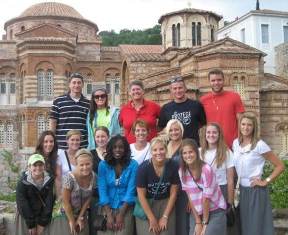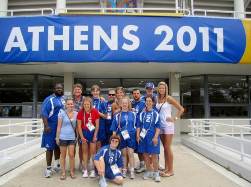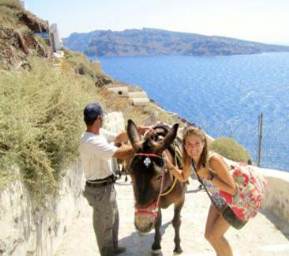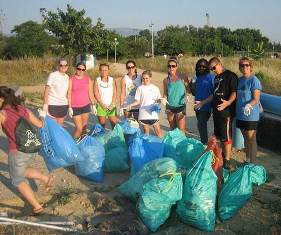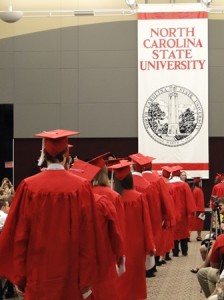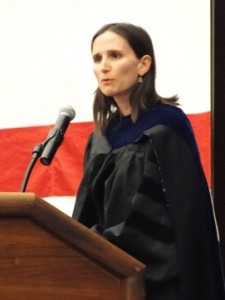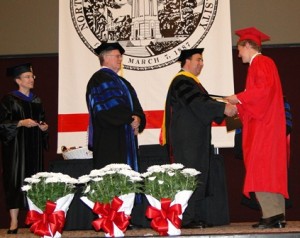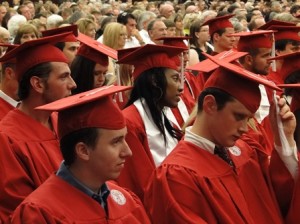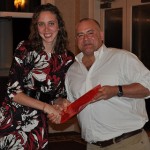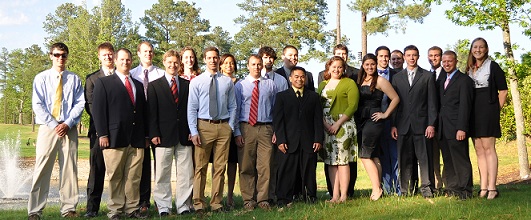Submitted by Erin Mester
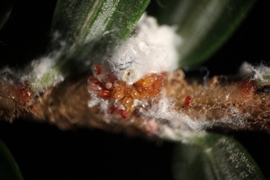 Call them one of “America’s Most Wanted” invasive pests: the hemlock woolly adelgid (HWA).
Call them one of “America’s Most Wanted” invasive pests: the hemlock woolly adelgid (HWA).
After arriving here from Asia in the early 1950’s, these pesky aphid-like insects have devoured their way through millions of hemlock trees and left a trail of “ghosts” through the forest.
Hemlocks grow throughout the southern Appalachians where some trees are more than 400 years old and grow as tall as 175 feet and six feet in diameter. Hemlocks may live more than 800 years and thrive in shade where their thick, evergreen foliage helps maintain moderate temperatures and moisture on the forest floor as well as provide numerous habitats for wildlife.
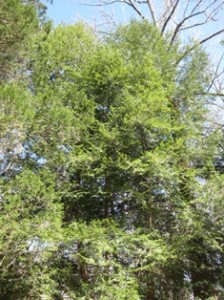
HWA have been steadily spreading throughout the south into some of the largest and oldest stands of hemlocks in the southern Appalachians and are killing eastern and Carolina hemlocks all within only a few years of initial infestation.
One PhD student at NC State University, Kelly Oten, is researching ways hemlock react to HWA with the hope of developing HWA-resistant hemlocks. Kelly’s research focuses on the behavior and morphology of HWA as well as the chemistry of hemlocks in regards to what makes one tree susceptible to HWA and another one resistant. It is known that Asian and pacific northwest hemlocks are resistant to HWA but not why.
Kelly is currently observing HWA with scanning electron microscopy (SEM), a surface-imaging technique, to investigate their feeding behaviors. 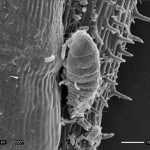 Little is known about the behavior of HWA and Kelly’s research is helping scientists to understand how they find a suitable feeding spot to feed. She is also investigating the chemical differences between seven hemlock species as well as individuals within the same species in the hopes to find what makes some species resistant to HWA. If a specific chemical is found in resistant trees, she can hypothesize that the chemical found is a deterrent to HWA, and attempt to confirm this through behavioral studies.
Little is known about the behavior of HWA and Kelly’s research is helping scientists to understand how they find a suitable feeding spot to feed. She is also investigating the chemical differences between seven hemlock species as well as individuals within the same species in the hopes to find what makes some species resistant to HWA. If a specific chemical is found in resistant trees, she can hypothesize that the chemical found is a deterrent to HWA, and attempt to confirm this through behavioral studies.
Kelly presented her work at the 5th Annual NCSU Graduate Student Research Symposium where she won 2nd place for her poster presentation, and at the Southeastern Meeting Entomological Society of America where she won 3rd place for the PhD student oral paper.
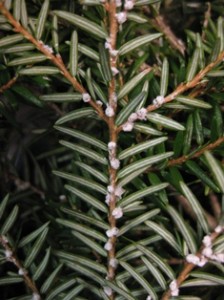 Chemical profiles of resistant hemlocks will be useful in developing breeding programs by screening for resistance and selecting for resistant individuals to use in these programs and will hopefully restore native hemlock forests. Eastern hemlock trees are also vital to the North Carolina nursery industry, and the HWAs that kill these trees are very costly to growers. Development of a resistant tree and/or other means of controlling this pest are required to save this industry.
Chemical profiles of resistant hemlocks will be useful in developing breeding programs by screening for resistance and selecting for resistant individuals to use in these programs and will hopefully restore native hemlock forests. Eastern hemlock trees are also vital to the North Carolina nursery industry, and the HWAs that kill these trees are very costly to growers. Development of a resistant tree and/or other means of controlling this pest are required to save this industry.
Kelly’s work is of particular interest to The Alliance for Saving Threatened Forests (ASTF), part of the North Carolina State University Center for Integrated Pest Management, in affiliation with the College of Natural Resources, which supports research on developing pest resistant trees and other means of controlling the adelgids. The Alliance’s long-term goal is restoring hemlock forests and other native trees in the Eastern United States that have succumbed to the adelgids.
If you would like to learn more about ASTF and current HWA research at NC State, please visit their website at: www.threatenedforests.com



